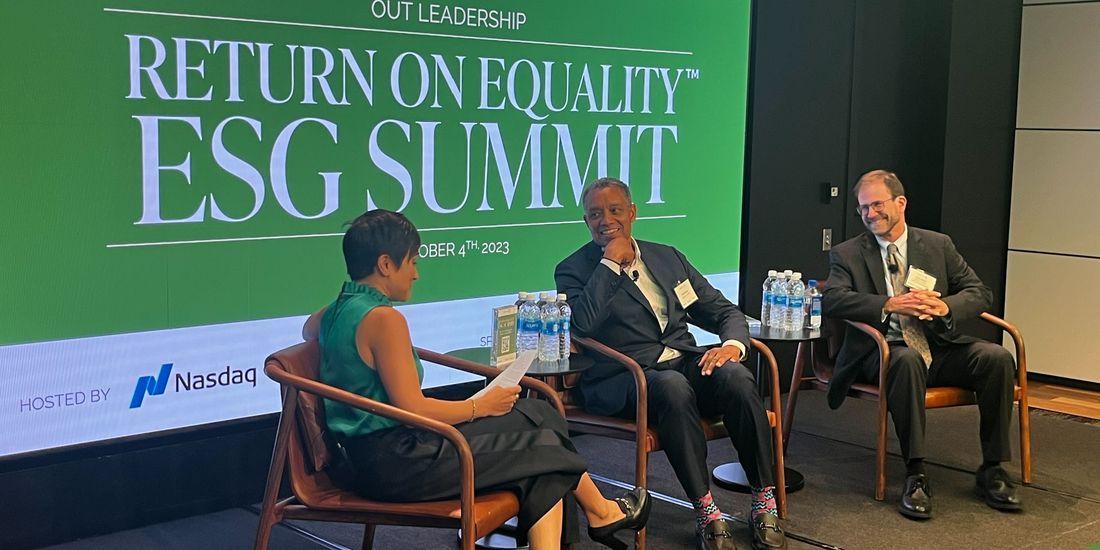
Nasdaq Summit Focuses On Improving ESG Reporting To Incorporate Strategies For Better Supporting Equality And Representation
Influenced by market forces and increasingly pulled by regulatory bodies, organizations of all kinds are leaning into more comprehensive Environmental, Social and Governance (ESG) and sustainability reporting. Nearly all large global companies disclose ESG efforts, and 86 percent of the companies reviewed in this study used multiple ESG-related standards and frameworks to present sustainability information.
Regardless of the nomenclature , investors, consumers, employees, and the policymaking bodies that oversee these companies want to understand what organizations are doing to manage risks and support their people and the planet in the work that they undertake. That's unlikely to change. Even when concepts like equity and inclusion are criticized as 'woke' to fit a political narrative, employees link their job satisfaction to their companies' commitment to diversity, equity and inclusion (DEI). In fact, according to IWBI's 2023 State of Workforce Well-Being Poll , conducted early this year, 78 percent of employees say that their company's commitment to DEI is an important part of their job satisfaction. As more stakeholders demand accountability from employers, measuring the impact on often underrepresented and marginalized communities is a must.
Despite the increase of frameworks designed to support organizations with building transparency and disclosure and supporting resources for companies to use in disclosures, there are many variances in how companies should address support for equality in their disclosures. In fact, only 14 percent of Fortune 100 companies and 10 percent of FTSE 100 companies disclose the size of their LGBTQ+ workforce.
This is according to Out Leadership's Return on EqualityTM ESG Report , which found that while 91 percent of Fortune 100 companies report on their LGBTQ+ inclusion efforts through their ESG and DEI reports, many employers still have work to do in the space of self-identification to ensure that this work translates to representation within their own employment base. It features personal context from IWBI President and CEO Rachel Hodgdon, as well as a section dedicated to the 12 Competencies for Measuring Health & Well-being , detailing how they help organizations meaningfully measure and report on leading DEI metrics.
The new report was released in concert with Out Leadership's inaugural Return on EqualityTM Summit, an LGBTQ+ inclusive ESG event hosted at Nasdaq MarketSite on October 4.
Ken Janssens, a Senior Advisor with Out Leadership, kicked off the first session of the summit by delving into an analysis of the report, which also outlines six leading reporting practices and four next-level reporting practices that effectively support LGBTQ+ inclusiveness in ESG reporting.
For the second session, IWBI President and CEO Rachel Hodgdon moderated a panel with John Adler, Chief ESG Officer, Office of New York City Comptroller, and Karl Racine, Partner, Hogan Lovells, and former Attorney General of Washington, D.C.
The panel, entitled“The Nationwide Status of ESG Laws, Corporate Support and the Economic Impact,” explored corporate attitudes towards LGBTQ+ equality – and the wider climate around ESG disclosure. Responses from both Racine and Adler were split. When both were asked their thoughts (in one word only) on the state of ESG globally, Racine remarked“fractured” to Adler's“improving.”
Adler noted that there was still“an increasing number of asset-owner offices with heads of sustainability, ESG, etc... It's still growing, especially internationally.”
However, Racine's point should not be interpreted pessimistically. He said it was“important to respond forcefully to the anti-ESG folks. Investing in your talent is incredibly important,” a clear endorsement for the“S”in ESG, and ended the session with“keep up the fight.”
Two more sessions closed out the day,“Why ESG should be more LGBTQ+ Inclusive from the Standpoint of Different Stakeholders (investors, regulators, workers/customers),” and a fireside chat,“Nasdaq Metrics that Matter: Navigating the ESG Investment Landscape.”
While backgrounds and viewpoints varied throughout the day's programming, one narrative was shared by nearly all who took to the stage: ESG helps inform risk and speaks to financial materiality, and therefore ESG disclosure, is here to stay. Furthermore, the data shows that less diverse businesses are less resilient businesses, meaning they pose riskier investments in the future.
View original content here .

Legal Disclaimer:
MENAFN provides the
information “as is” without warranty of any kind. We do not accept
any responsibility or liability for the accuracy, content, images,
videos, licenses, completeness, legality, or reliability of the information
contained in this article. If you have any complaints or copyright
issues related to this article, kindly contact the provider above.


















Comments
No comment